-
Letter from Justice Sandra Day O’Connor to Randy J. Holland: April 23, 1991

Supreme Court of the United States
Washington, D.C. 20543CHAMBERS OF JUSTICE SANDRA DAY O’CONNOR
April 23, 1991
The Honorable Randy Holland
Supreme Court of Delaware
208 Courthouse
Georgetown, DE 19947Dear Justice Holland,
Thank you for your letter in support of Richard Pepperman who has applied for a position as a law clerk. Unfortunately, I have already completed my selections for the 1992 Term, but hope he will be considered in other Chambers.
Sincerely,
Sandra Day O’Connor
Categories: Sandra Day OconnorTags: delaware, judge, judiciary, justiceholland, justiceo’connor, law, lawyer, legal, Letters, randyholland, sandradayo’connor, scotus, supremecourt -
Letter from Justice Sandra Day O’Connor to Randy J. Holland: September 28, 1990

Presentation of the Honorary Degree
Doctor of LawsThe Honorable Sandra Day O’Connor
Friday, September 28, 1990 11:00 a.m.
Ticket No. 64
Categories: Sandra Day OconnorTags: delaware, judge, judiciary, law, lawyer, legal, Letters, randyholland, sandradayo’connor, scotus, supremecourt -
Letter from Justice Sandra Day O’Connor to Randy J. Holland: October 3, 1990
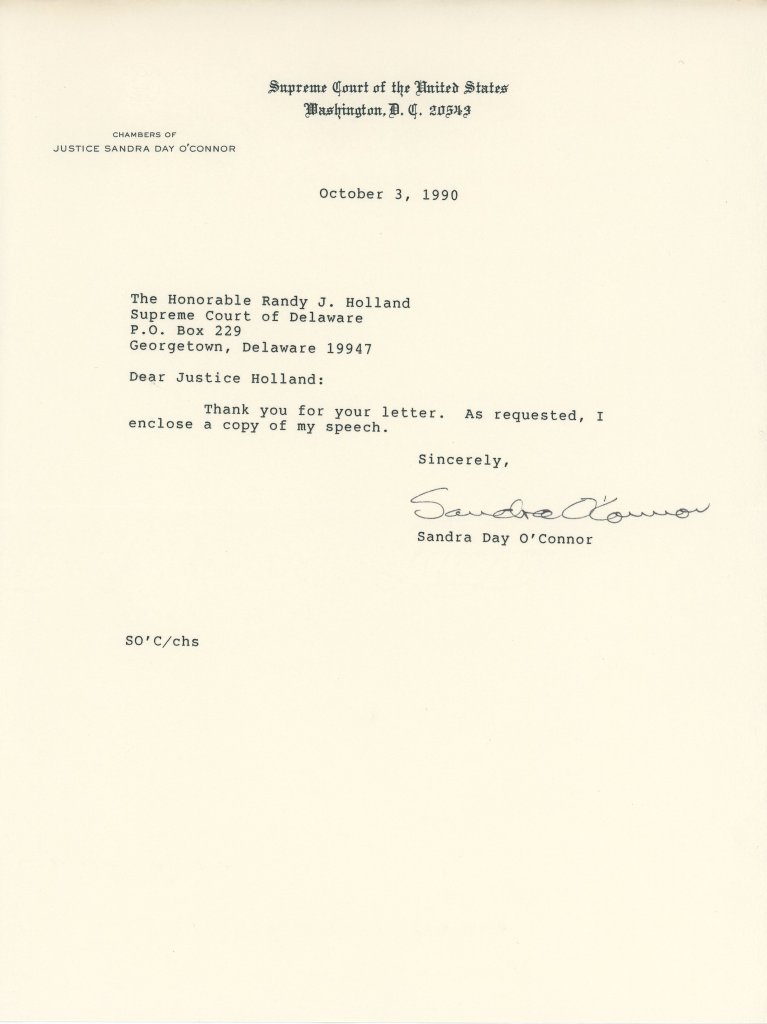
CHAMBERS OF JUSTICE SANDRA DAY O’CONNOR
Supreme Court of the United States
Washington, D. C. 20543October 3, 1990
The Honorable Randy J. Holland
Supreme Court of Delaware
P.O. Box 229
Georgetown, Delaware 19947Dear Justice Holland:
Thank you for your letter. As requested, I
enclose a copy of my speech.Sincerely,
Sandra Day O’ConnorCategories: Sandra Day OconnorTags: delaware, judge, judiciary, justice holland, justiceo’connor, law, lawyer, legal, Letters, randyholland, scotus, supremecourt -
Letter from Justice Samuel Alito to Randy J. Holland: October 13, 2017

CHAMBERS OF JUSTICE SAMUEL A. ALITO, JR.
Supreme Court of the United States
Washington, D. C. 20543October 13, 2017
The Honorable Randy J. Holland
Delaware State Bar Association
8 W. Laurel Street
Georgetown, DE 19947Dear Randy:
It’s good to get your letter and to learn that you’ve been busy since retiring from the Delaware Supreme Court. I am honored by your invitation to speak to the judges and lawyers in Delaware. Unfortunately, I promised Martha-Ann (and myself) that I would not agree to any additional outside commitments for at least the upcoming Court term. I have overextended myself in recent years, and I think I must take a break for at least a while.
Thank you for your letter and for the kind invitation. If you’re ever in Washington, I hope you stop by for a quick hello.
Sincerely,
SamCategories: Samuel AlitoTags: delaware, judge, judiciary, justicealito, law, lawyer, legal, Letters, randyholland, samuelalito, scotus, supremecourt -
Letter from Justice Samuel Alito to Randy J. Holland: May 05, 2017
May 5, 2017
The Honorable Randy J. Holland
Supreme Court of Delaware
P.O. Box 369
Georgetown, Delaware 19947Dear Randy:
Thank you for your letter of April 17th inviting me to meet with your admissions group on Monday, May 22nd. Unfortunately, I have a conflict that prevents me from stopping by that morning.
I’m sorry I will not be there to say a quick hello to you, but I understand that Justice Ginsburg will stop by to greet the group. Would you please extend my warmest congratulations to those who will be admitted to the Supreme Court Bar.
I hope your attorneys enjoy their visit to the Supreme Court. Thank you for your letter.
Sincerely yours,
Sam
CHAMBERS OF JUSTICE SAMUEL A. ALITO, JR.
Supreme Court of the United States
Washington, D. C. 20543May 5, 2017
The Honorable Randy J. Holland
Supreme Court of Delaware
P.O. Box 369
Georgetown, Delaware 19947Dear Randy:
Thank you for your letter of April 17th inviting me to meet with your admissions group on Monday, May 22nd. Unfortunately, I have a conflict that prevents me from stopping by that morning.
I’m sorry I will not be there to say a quick hello to you, but I understand that Justice Ginsburg will stop by to greet the group. Would you please extend my warmest congratulations to those who will be admitted to the Supreme Court Bar.
I hope your attorneys enjoy their visit to the Supreme Court. Thank you for your letter.
Sincerely yours,
SamCategories: Samuel AlitoTags: delaware, judge, judiciary, justicealito, law, lawyer, legal, Letters, randyholland, samuelalito, scotus, supremecourt -
Letter from Justice Samuel Alito to Randy J. Holland: March 28, 2017

CHAMBERS OF JUSTICE SAMUEL A. ALITO, JR.
Supreme Court of the United States
Washington, D. C. 20543March 28, 2017
The Honorable Randy J. Holland
Supreme Court of Delaware
P.O. Box 369
Georgetown, Delaware 19947Dear Randy:
I congratulate you on 30 years of exemplary judicial service. You have made a great contribution to the law, and you should be very proud of all that you have accomplished.
It was very kind of you to invite Martha-Ann and me to the dinner in Wilmington on April 12, and we wish that we could attend. Unfortunately, my schedule makes that impossible. We have a conference the following morning, and therefore attending the dinner would require a lot of late night driving and would leave me pretty groggy at the conference.
While we can’t be there on the 12th, we send our congratulations and very best wishes for whatever you choose to do next.
Sincerely,
SamCategories: Samuel AlitoTags: delaware, judge, judiciary, justicealito, law, lawyer, legal, Letters, randyholland, samuelalito, scotus, supremecourt -
Letter from Justice Samuel Alito to Randy J. Holland: November 01, 2016

CHAMBERS OF JUSTICE SAMUEL A. ALITO, JR.
Supreme Court of the United States
Washington, D. C. 20543November 1, 2016
The Honorable Randy J. Holland Supreme Court of Delaware
Post Office Box 369
Georgetown, Delaware 19947Dear Randy:
Congratulations on celebrating 30 years on the bench! When I heard about the event, I was certain that someone had done the math wrong because you are far too young to have been a judge that long. I checked Wikipedia, which of course is always accurate, and found that it confirms that you were appointed in 1986. You must have been ten years old at the time!Seriously, you have made a great contribution by your many years exemplary service. Here’s to 30- or maybe 60 – more years.
Sincerely yours,
SamCategories: Samuel Alito -
Two new photos of Justice Holland
Here are two newly found photos of my mom and dad, from Jeff Tease. Jeff’s dad gave my dad his first job as a lawyer. This photo is in Milford, DE on the Tease family’s porch in Lakelawn. Dad was 25 and Mom was 22. They were married that same year in June. Dad is wearing his favorite T-shirt: Swarthmore colors with his favorite number 12. Dad was a quarterback in high school and college and always wore number 12. He was even sworn in as a judge on December 12th. -Ethan (Justice Holland’s son)

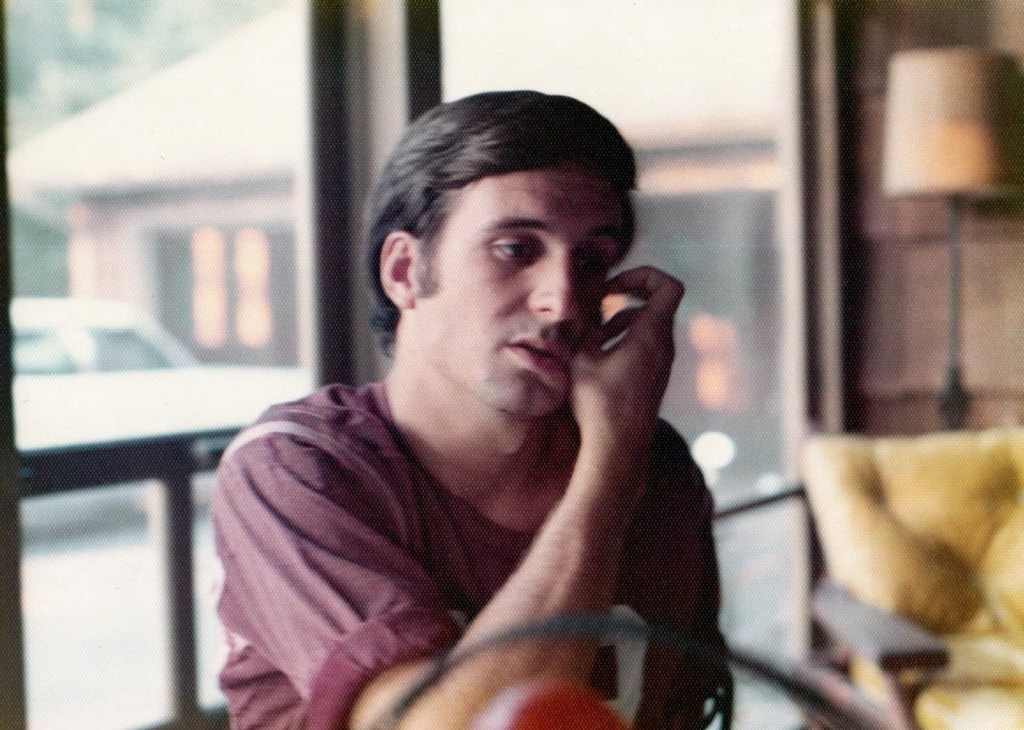 Categories: Family
Categories: Family -
Happy 113th Birthday to James Holland (Randy’s father)
Happy what would have been 113th birthday to my dad’s father, my Grandpa Holland.
My grandfather was the oldest of twelve children. My dad was the first on that side of the family to go to college. Grandpa Holland had a tough life, was deeply traumatized by war, and spent most of his life battling alcohol and poverty. He and his brothers were all overseas when the rule made famous by “Saving Private Ryan” was established. My grandfather chose to stay deployed rather than return home, so his younger siblings could come back. He was a tank commander with Patton’s US Third Army when they ran out of gas. He flew behind enemy lines via glider. He fought in the Battle of the Bulge. He had nightmares about white phosphorus. He helped free a concentration camp, but I forget which one.
He succeeded in making me think he was a happy person. That’s a tremendous gift, and I appreciate it. I often say “this one’s for you” whenever I make a good decision.
One thing is for sure, my Dad and Uncle Jim turned out to be two of the most intelligent, generous, athletic, empathetic, methodical, hard-working, and kind-hearted people I’ve ever known.
-Ethan Holland



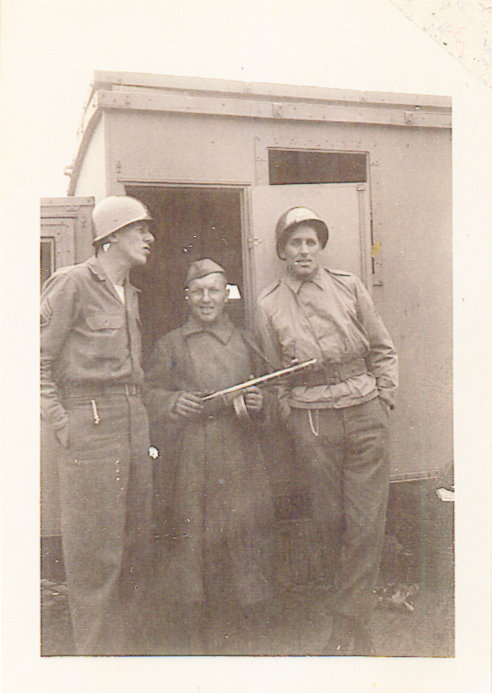
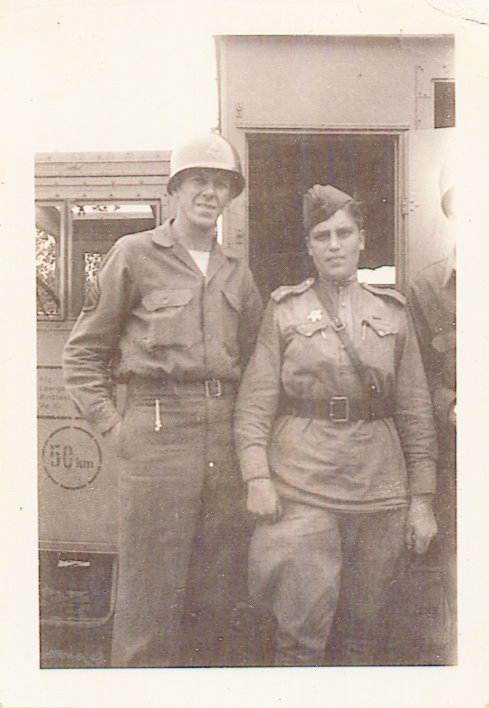
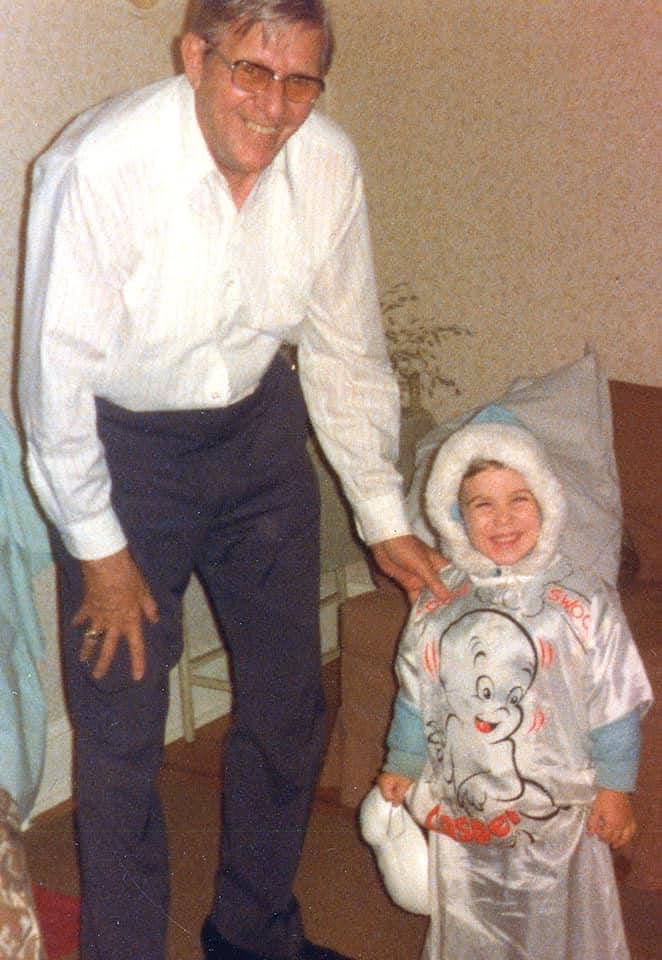


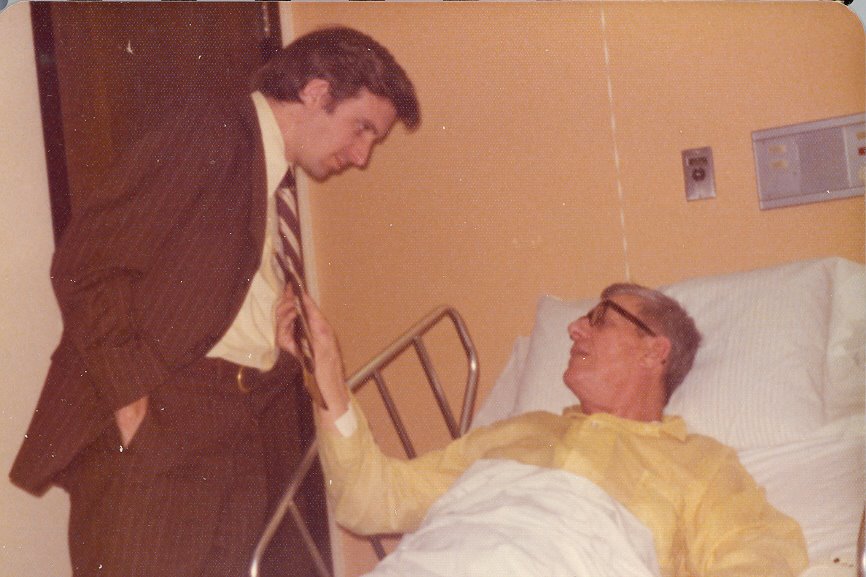
 Categories: Biography
Categories: Biography -
Letter from Justice Samuel Alito to Randy J. Holland: May 26, 2015

CHAMBERS OF JUSTICE SAMUEL A. ALITO, JR.
Supreme Court of the United States
Washington, D. C. 20543May 26, 2015
The Honorable Randy J. Holland
Supreme Court of Delaware
Post Office Box 369Georgetown, Delaware 19947
Dear Randy:
I was honored to receive your invitation to speak at a joint dinner meeting for the seven Delaware American Inns of Court next March. Unfortunately, I am afraid that I cannot accept. My wife and I are planning to fit a foreign trip into the period during March when the Court is not sitting. That will make for a very hectic month, and I cannot add in any other outside obligations.
I trust the meeting will be a success, and I thank you for the invitation.
Sincerely yours,
SamCategories: Samuel Alito
-
Subscribe
Subscribed
Already have a WordPress.com account? Log in now.